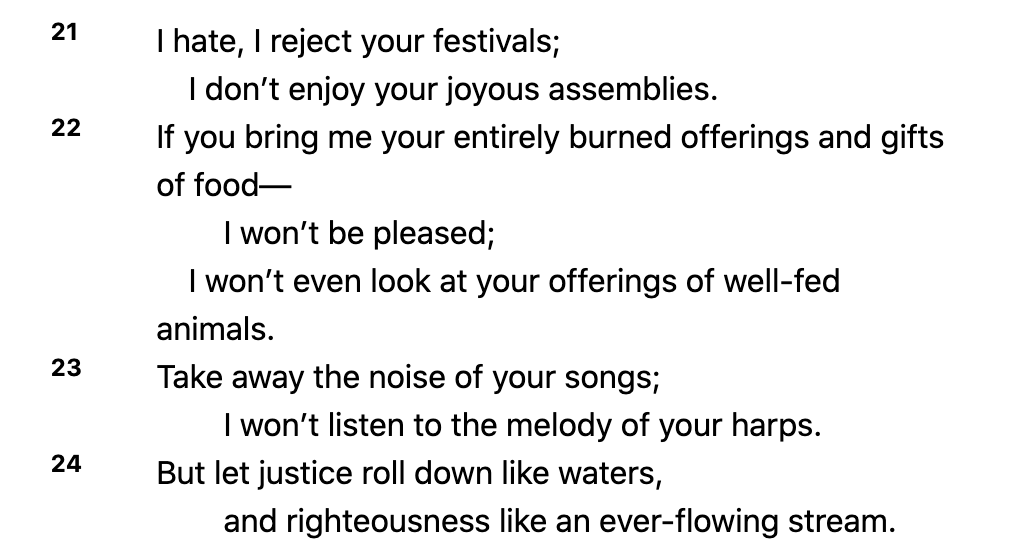God Speaks; Will We Listen?

In the book of Amos, God speaks out against the crimes of all people. Amos proclaims the words that God has delivered to him, and he prophesies against the injustices of Damascus, Gaza, Ashdod, Tyre, Edom, Ammon, Moab, Judah, and finally Israel. As we read through that list, we may remember that some of these are local cities in the near vicinity of the people of Israel, and others are neighboring people groups and kingdoms. But, Amos’ words reach a crescendo when Amos reaches the nations of Judah and Israel. Up until this point, the people who were listening might have heard the words spoken against these other peoples and places, and thought to themselves that God was out to get the enemies of Israel. But when Amos reaches Judah and Israel, we realize that all of these other nations were just the opening act.
The main story was with God’s people themselves who had committed crimes against their brothers and sisters, against their neighbors and the foreigners, against the poor and afflicted. And when Amos reaches the passage quoted above in Amos 5:21-24, we hear not only the judgment that God is levying against this people (who were supposed to be his people), we also hear the very heart of God. That Justice would roll down like waters and righteousness like an ever-flowing stream.
Justice and Righteousness.
In fact, God cares so much about the people living out these characteristics that he prefers that they abandon their worship of him and seek after other gods (Amos 5:26) if they are not going to live out these attributes that are so close to God’s heart.
So, my question now becomes: Why?
Why would God prefer that we abandon worshipping him if we are not to live out these virtues?
Over and over again, the only answer that I can think of is that these acts of justice and righteousness are so closely held within God’s own identity, that to abandon these practices is to abandon God’s very self.
In Exodus, God reveals God’s self to Moses, and this is what God proclaims in that moment: “The Lord! The Lord! a God who is compassionate and merciful, very patient, full of great loyalty and faithfulness, showing great loyalty and faithfulness, showing great loyalty to a thousand generations, forgiving every kind of sin and rebellion, yet by no means clearing the guilty, punishing for their parents’ sins their children and their grandchildren, as well as the third and the fourth generation” (Exodus 34:6-7).
Justice.
In God’s self-disclosure to Moses (and thus to the rest of us through the writing of Scripture), God wants to make sure that we know that God is a God of Justice. God forgives, yes. But God does not forget the guilty.
Not only that, but God shares a law code with the people during their time at Mount Sinai in the wilderness. This law code is much to expansive to quote here. It contains parts of the books of Exodus, Numbers, and Deuteronomy, and the entirety of the book of Leviticus. Some scholars and readers of Scripture boil it down to 613 commands; Jesus tells us that 2 of these contain all the rest within them. But clearly, God cares about how we live, what we do, and with what purpose we do it. God desires that we live righteously.
Righteousness.
Justice and Righteousness.
The opening books of the Bible are filled with examples of how these characteristics matter, and how they are to be lived out.
And so, Amos looks around him at the way the people are living and treating one another, and God’s word comes to him. He cannot keep from prophesying this oh-so-important characteristic of who God is and who the people are called to be. They are to let Justice and Righteousness flow down like the waters of a mighty river throughout the land, bringing life to all, whether rich or poor, stranger or neighbor, brother or sister–to all.
This week, seek not only to live as a kind person. Seek to live as a bringer of justice and righteousness. Live as God has called us to live–by loving our neighbors as we love ourselves all the while we seek to love our God. When we do so, God will look upon us and know that our worship is true, and that it is pleasing.

